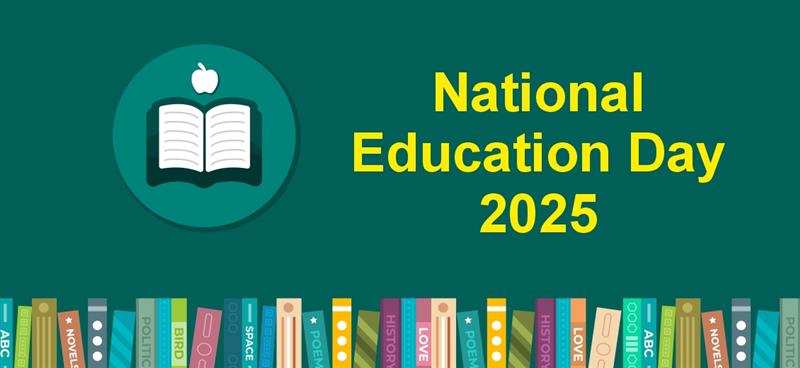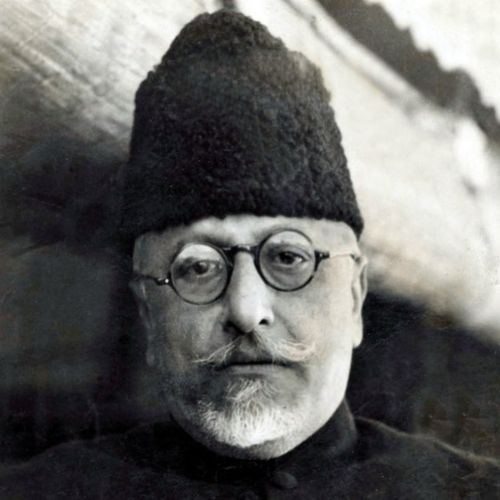National Education Day 2025: History, Significance, and Government Initiatives Shaping India’s Future
Blogs Home
- 11 Nov 2025

“We want to develop an education system so that the youth of our country don’t need to go abroad. Our middle-class families need not spend lakhs and crores of rupees. Not only that, we also want to create such institutions that attract people from abroad to come to Bharat instead.”
— Prime Minister Shri Narendra Modi
Introduction: Honouring a Visionary, Empowering a Nation
Every year, on 11th November, India celebrates National Education Day — a day dedicated to the memory of Maulana Abul Kalam Azad, the first Education Minister of independent India and one of the nation’s most profound thinkers and reformers.
More than just a commemoration, this day is a celebration of the transformative power of education — the force that shapes individuals, builds societies, and drives nations forward. With 65% of India’s population under the age of 35, our greatest national asset is our youth. To unlock their potential, the government continues to build a strong, inclusive, and future-ready education system — one that empowers every learner to be a changemaker.
Maulana Abul Kalam Azad: Architect of Modern Indian Education
Born on 11th November 1888, in Mecca, Maulana Abul Kalam Azad was a visionary scholar, freedom fighter, and intellectual giant. As India’s first Education Minister (1947–1958), he envisioned an education system rooted in knowledge, ethics, and innovation.
Azad believed that education was the foundation of democracy and progress. Under his leadership, India established some of its most iconic institutions — the University Grants Commission (UGC), All India Council for Technical Education (AICTE), Council of Scientific and Industrial Research (CSIR), Indian Institute of Technology (IIT) Kharagpur, Indian Council for Cultural Relations (ICCR), Sahitya Akademi, Lalit Kala Akademi, and Sangeet Natak Akademi.
His work laid the foundation for a system that valued both scientific inquiry and cultural enrichment, bridging tradition and modernity.
“Education imparted by heart can bring revolution in the society.”
— Maulana Abul Kalam Azad
National Education Day 2025: Purpose
The day emphasizes that true progress lies in ensuring that every child and adult — regardless of background, gender, or region — receives the opportunity to learn, grow, and contribute meaningfully to society.
Across India, schools and institutions mark the day through cultural programs, seminars, exhibitions, debates, and discussions that reflect Maulana Azad’s life, ideas, and contributions.
Transforming India through Education
India’s commitment to education as a tool for empowerment is deeply embedded in its constitutional and policy frameworks.
The 86th Amendment of the Constitution introduced Article 21-A, making free and compulsory education for children aged 6–14 years a Fundamental Right. This principle was further strengthened through the Right to Education (RTE) Act, 2009, which ensures every child has access to quality elementary education.
Building upon these foundations, a series of flagship initiatives under the visionary leadership of Prime Minister Narendra Modi have redefined the education landscape:
- National Education Policy (NEP) 2020: Approved in 2020, NEP 2020 is a comprehensive framework aimed at transforming India into a global knowledge superpower. It emphasizes flexibility, holistic learning, and skill development aligned with the needs of the 21st century.
- PM SHRI Schools: Launched in 2022, this initiative will upgrade over 14,500 schools across India, showcasing the core principles of NEP 2020. With a project cost of ₹27,360 crore (2022–2027), PM SHRI focuses on cognitive development, sustainability, and 21st-century skills.
- Samagra Shiksha: Operational since 2021, this scheme provides equitable, inclusive, and quality education, addressing the diverse needs of learners and continuing until March 2026.
- PRERNA: Launched in Vadnagar, Gujarat, PRERNA is a week-long residential program designed to blend innovation with India’s cultural heritage. Each week, 20 students from across the country engage in experiential learning and inspiration.
- ULLAS (Nav Bharat Saaksharta Karyakram): Running from FY 2022–2027, this program empowers adults aged 15 and above who missed formal education. It aligns with NEP 2020’s vision of lifelong learning and aims to create a literate, self-reliant society.
- NIPUN Bharat: Launched in 2021, this national mission aims to ensure that every child attains foundational literacy and numeracy by the end of Grade 3 by 2026–27.
- Vidya Pravesh: Introduced in 2021, this three-month play-based module ensures a joyful transition for children entering Grade I, setting the tone for lifelong learning.
- Vidyanjali: Launched in 2021, this initiative fosters community and private sector participation to strengthen school education through volunteerism and CSR contributions.
- DIKSHA: Launched in 2017, DIKSHA enhances teacher training and learning resources through digital innovation, empowering educators nationwide.
- SWAYAM Plus: Officially launched in 2024, this platform bridges academia and industry by offering credit-recognized, skill-based online courses, improving employability and industry readiness.
- NISHTHA: Launched in 2019, NISHTHA focuses on teacher training and professional development. Following the pandemic, it evolved into NISHTHA-Online, and later NISHTHA 2.0 (for secondary teachers) and NISHTHA 3.0 (for foundational literacy and numeracy).
- NIRF Rankings: Introduced in 2015, the National Institutional Ranking Framework promotes transparency and competition among higher education institutions, driving quality and accountability.
- PM-Vidyalaxmi Scheme: This scheme provides education loans for students admitted to the top 860 institutions across India. With a budget of ₹3,600 crore (2024–31), it benefits over 22 lakh students annually, ensuring that financial constraints never stand in the way of learning.
Investing in Education for a Brighter Future
India’s progress is inseparable from its investment in education. In the Union Budget 2024–25, the Department of School Education & Literacy received a record ₹73,498 crore, marking a 19.56% increase over the previous year. Notably, ₹9,302 crore was allocated to Kendriya Vidyalayas and ₹5,800 crore to Navodaya Vidyalayas — the highest-ever allocations.
The Department of Higher Education received ₹47,619.77 crore, reflecting a 7.99% increase from FY 2023–24. This includes ₹7,487.87 crore for schemes and ₹40,131.90 crore for non-scheme expenses — a strong indication of the government’s focus on expanding access, innovation, and research.
Rising Enrolment and Inclusivity: AISHE Report 2021–22
The All India Survey on Higher Education (AISHE) 2021–22, released in January 2024, highlights remarkable progress in access, diversity, and gender equity in higher education.
- Female enrolment increased from 1.57 crore (2014–15) to 2.07 crore (2021–22) — a 32% growth.
- The Gender Parity Index (GPI) reached 1.01, showing that more women are now enrolled in higher education than men.
- Enrolment among SC, ST, OBC, and minority groups also saw significant increases, demonstrating India’s growing inclusivity.
- Enrolment in STEM disciplines reached 98.5 lakh students, and dropout rates at the secondary level fell from 21% (2013–14) to 13% (2021–22).
These numbers reflect the success of a policy ecosystem that places equality, quality, and accessibility at its core.
Education as the Cornerstone of Nation-Building
Education in India is no longer confined to classrooms — it’s evolving into a dynamic ecosystem that nurtures creativity, critical thinking, and compassion. From NEP 2020 to PM SHRI, every initiative aims to empower youth with the skills to lead and innovate.
As we honor Maulana Abul Kalam Azad’s legacy, we also celebrate the spirit of an India that learns, leads, and lights the way for the world.
“Educationists should build the capacities of inquiry, creativity, entrepreneurial and moral leadership among students and become their role models.”
— Maulana Azad
Conclusion: Learning Today, Leading Tomorrow
National Education Day 2025 is not just a tribute — it’s a call to action.
It reminds us that education is the most powerful investment a nation can make in its future.
From the classroom to the digital platform, from literacy to lifelong learning — every reform, every scheme, and every initiative contributes to “Viksit Bharat”, an India that educates not only its people but the world.
Let us celebrate this National Education Day by reaffirming our collective promise:
To make Bharat a global beacon of knowledge, inclusion, and innovation — just as Maulana Azad dreamed it to be.
Read More….





